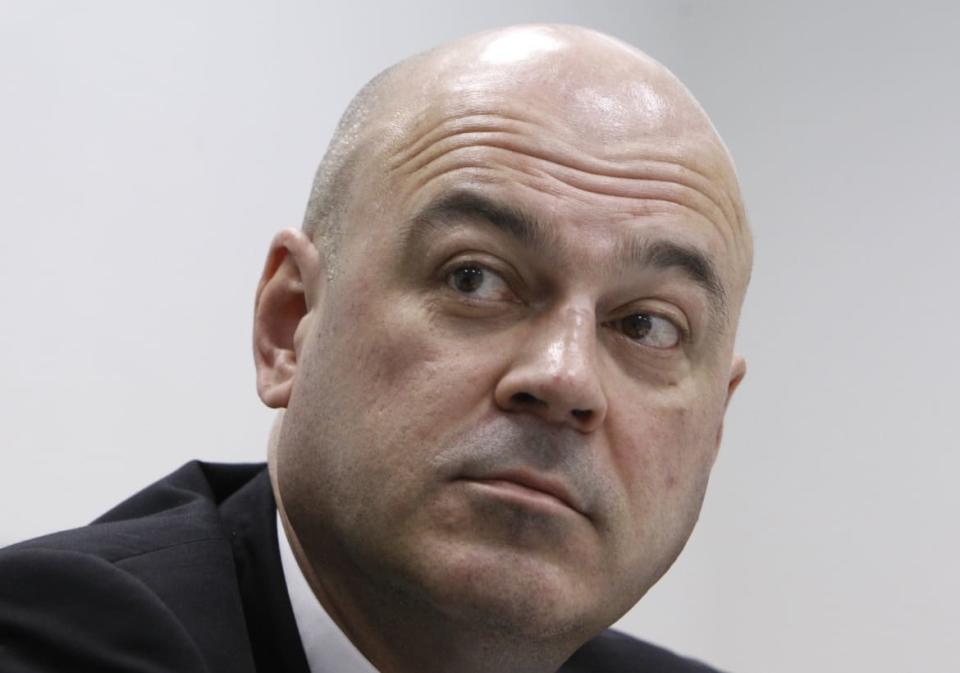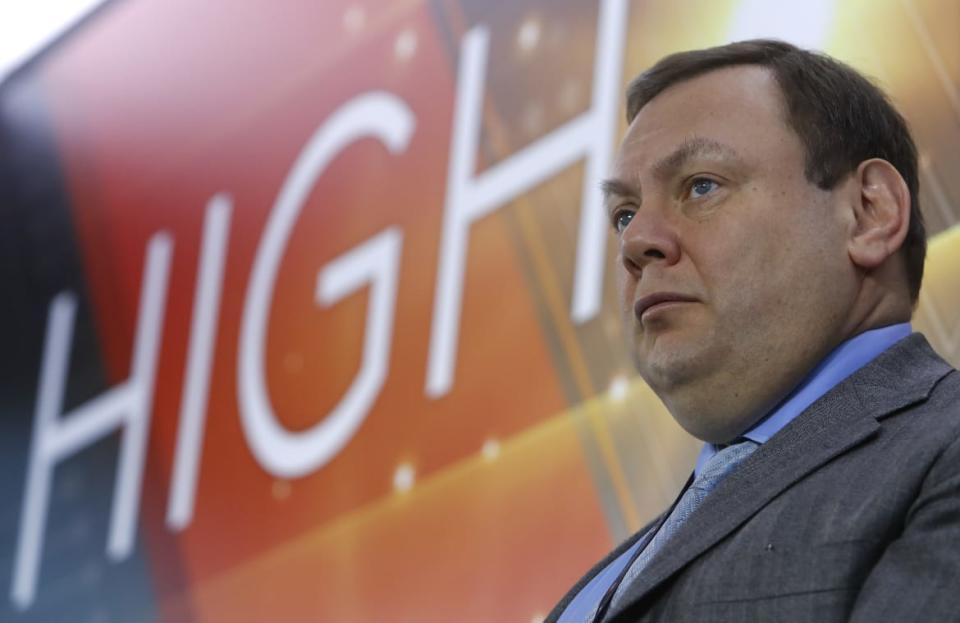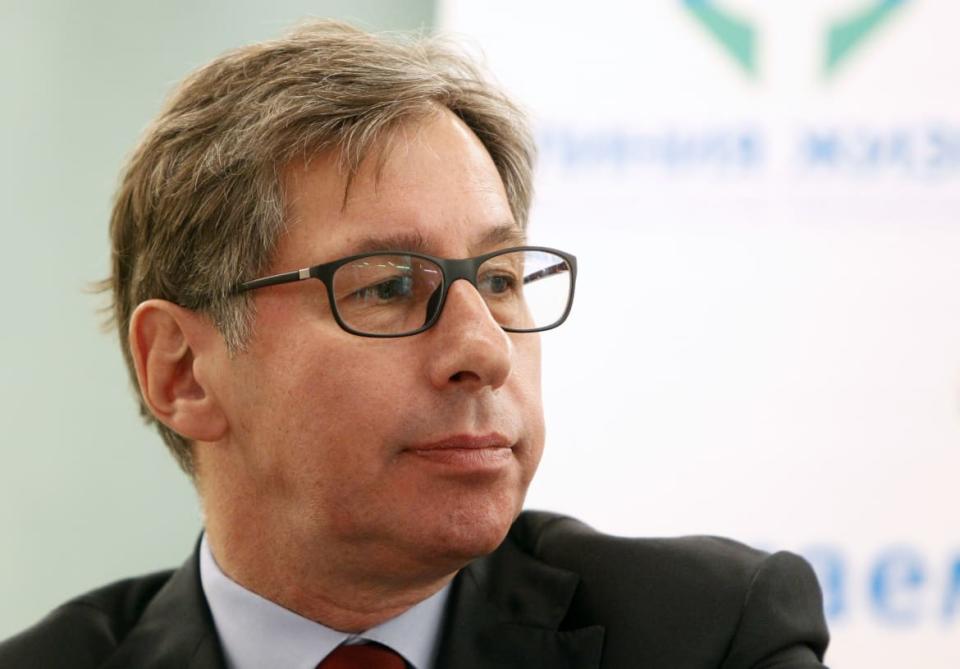NYC Scion Says He Was Secretly Hoodwinked by Russian Oligarchs

- Oops!Something went wrong.Please try again later.
- Oops!Something went wrong.Please try again later.
- Oops!Something went wrong.Please try again later.
- Oops!Something went wrong.Please try again later.
The scion of a venerable New York family descended from 19th century railroad and shipping tycoon Cornelius Vanderbilt says he was bamboozled by a U.S. private equity firm secretly fronting for a cabal of wealthy Russian oligarchs with direct ties to Vladimir Putin.
A group of financiers that Carter Burden III thought were providing a much-needed financial boost to his successful cloud services provider, Logicworks, were in fact responsible for its eventual collapse, forcing a fire sale for a fraction of the company’s worth, according to a newly filed fraud lawsuit.
What Burden didn’t know, and about which he says he was fed an ongoing string of lies by intermediaries, was that Pamplona Capital Management, the outfit that in 2016 bought a majority stake in Logicworks, was “less than a proper investment fund and more of a shell company” created to invest the personal fortunes of Mikhail Fridman, Petr Aven, German Khan, and Alexey Kuzmichev, according to him. The four oligarchs are all said to be connected to the Kremlin, and at least one has been credibly accused of international money laundering. (None of them are named as defendants in Burden’s suit.)
“For years, Pamplona’s representatives lied to and obscured the truth from Mr. Burden to prevent him from learning the truth,” states the 22-page lawsuit, which was filed in Manhattan Supreme Court on Friday and added to the public docket Saturday morning. “Fights with regulators were conveniently explained away. Concerns from banks and outside investors were swept aside. And questions from Mr. Burden were either deflected or simply falsely answered.”
Unaware of his new business partners’ true identities, Burden’s Logicworks continued to thrive—until Russia invaded Ukraine early last year, the suit says.

Alexey Kuzmichev.
Soon, the four oligarchs with whom Burden, 55, had unwittingly gone into business became international pariahs cut off from the global banking system. Suddenly, Burden found his company had become kryptonite to banks, investors, and government regulators, according to his lawsuit.
On Feb. 28, 2022, Fridman, founder of the U.S.-blacklisted Alfa Bank, along with Alfa Bank president Aven— who served as Russia’s minister of foreign economic relations in the early 1990s, when both Aven and Fridman were accused of having links with organized crime, money laundering, and drug trafficking—were hit with E.U. sanctions. A little more than two weeks later, Khan, who reportedly had a penchant for attending business meetings armed with a pistol, and Kuzmichev, who last year had a pair of yachts seized by French authorities, were added to the list. The U.K. immediately followed, slapping their own sanctions on Fridman, Aven, Khan, and Kuzmichev.
In the end, Burden says he was forced to sell his company. But by that time, few buyers had the stomach for it. Because Logicworks was saddled with serious legal and geopolitical exposure due to its Russian backers, Burden had to unload it at “artificially deflated prices,” his lawsuit says.
What was supposed to be a lifeline for Burden ultimately wound up costing him, he claims, “tens of millions of dollars.”
Rise and fall
Burden, whose late father, politician/philanthropist/broadcasting mogul/art collector/man-about-town Carter Burden Jr., has been described as the “premier example of a limousine liberal,” founded Digital Telemedia Inc., a New York City internet service provider, in 1993. In 2001, Digital Telemedia shifted its focus to cloud-hosting services and rebranded as Logicworks. The company serviced clients in the financial and health-care sectors who entrusted it with “managing highly sensitive, proprietary, and confidential information,” according to Burden’s suit.
As Logicworks grew, it found itself in need of a capital infusion, the lawsuit goes on. In 2011, Burden and his team sold a minority interest in the company to Seaport Capital Partners, a VC firm in the Wall Street area. Five years later, when Seaport opted to unwind its position, Logicworks decided to seek a majority investor that would buy out Seaport’s stake and a portion of Burden’s, which Burden hoped would provide a necessary cash infusion and allow him to stay involved in the company’s operations.
By Sept. 2, 2016, Logicworks had received 14 bids, the lawsuit states. One of them was from Pamplona Capital Management LLP, which, according to the suit, billed itself as managing more than $10 billion in assets for “a variety of clients including public pension funds, international wealth managers, multinational corporations, family offices and funds of hedge funds.”
Pamplona Capital said it wanted to acquire Logicworks for its new tech-focused fund, Pamplona TMT I, L.P., the lawsuit goes on. It would aim to maximize Logicworks’ “longterm value,” which meshed with Burden’s vision.
“At no time did either of any Pamplona entity (or any entity or individual working on their behalf) disclose Pamplona’s true nature as the personal investment fund of the Russian oligarchs,” the lawsuit states.
The transaction closed on Dec. 15, 2016.
In the fall of 2018, Burden’s lawsuit says Pamplona executive Darren Battistoni approached him and his CEO about a co-investment opportunity in an IT management company. Pamplona’s $40 million bid had already been accepted, according to the lawsuit. However, the suit explains, the Pamplona exec told Burden that the U.S. government’s Committee on Foreign Investment in the United States (CFIUS) “had since intervened to prevent Pamplona TMT from executing the transaction; and, as a result, Pamplona TMT was seeking to fund the deal through other sources.”
Alarmed, Burden asked what it was that prompted CFIUS to get involved. The answer he got, according to Burden’s lawsuit, was that Pamplona TMT “had simply been swept up in CFIUS’s recent new enforcement protocol because it was based in the United Kingdom.” New guidelines were coming out, and if they proved too burdensome, then Pamplona could avoid any trouble by simply redomiciling itself in the U.S.
“What Mr. Burden did not know and could not know, however, was that Mr. Battistoni’s explanation was false, and was simply designed to placate Mr. Burden and prevent him from learning the truth: CFIUS had targeted Pamplona TMT not because it was domiciled in the United Kingdom, but because it was closely tied to men within Vladimir Putin’s inner circle,” the suit states.
Victim of war
As 2019 rolled around, Pamplona remained under close scrutiny by CFIUS. During the first few months of the year, Burden finally learned that he had unknowingly gone into business with a crew of politically exposed foreign nationals. But he still didn’t know their names or that they controlled all of Pamplona, he said.
That April, CFIUS forced Pamplona to sell a majority stake it had in Cofense, an internet security firm that works with Fortune 500 companies as well as the federal government. In response, Burden’s lawsuit says Pamplona transferred its equity in Logicworks over to a brand-new investment vehicle it created called Deanwood TMT, “an entity—ironically enough—with even closer ties to the Russian oligarchs in Vladimir Putin’s regime.”

Mikhail Fridman.
By the middle of 2020, Logicworks found itself in a dire cash crunch. Banks and lenders had shunned the company, having been scared off by the CFIUS probes, the lawsuit says. And Logicworks needed money to continue its growth.
In July 2020, Burden contacted his bankers at JP Morgan, where he had a longstanding relationship. He asked about securing a loan to keep Logicworks solvent, according to the suit.
“JP Morgan, in turn, informed Mr. Burden that the bank had learned that three of the equity-holders in Deanwood TMT were Russian oligarchs Mikhail Fridman, German Khan, and Alexey Kuzmichev,” it states. “Mr. Burden was furious: he did not know who the three Russians were, how they were involved with Logicworks, or why their involvement should have any bearing on his company’s longstanding relationship with JP Morgan. These protestations, however, fell on deaf ears; JP Morgan declined to issue a loan to Logicworks, and, soon after, also informed Logicworks that it had to close all of the company’s accounts.”
Burden says he had no choice but to begin pumping his own money into Logicworks, funneling some $7 million into its coffers. Even with its financial problems, Logicworks stayed afloat and in August 2020 even received a $315 million buyout offer from Accenture, according to the lawsuit. But “after looking further into the company,” the consulting firm withdrew its offer, it says. Logicworks was able to get a series of interim loans, though they still didn’t stem the bleeding. At the end of 2021, Burden met with one of the Pamplona executives to discuss raising $50 million from a new minority partner.

German Khan.
Over lunch, Burden says the exec, Justin Perreault, told him that Pamplona wasn’t interested in the proposal, and in fact, wanted to sell off its own stake in Logicworks. The Pamplona exec allegedly said they had always planned to exit the partnership after seven years.
“This, of course, was a lie,” the lawsuit states. “Pamplona TMT, Deanwood TMT, and Pamplona Capital simply wanted to exit their positions because they could no longer hide their true nature as fronts for powerful Russians financing Vladimir Putin’s regime who were increasingly unwelcome to conduct business in the United States.”
And, the suit continues, “given their close ties to Putin’s inner circle, the Pamplona entities (including Deanwood TMT) knew one other thing: Russia was preparing for war.”
In February 2022, Pamplona put Logicworks up for sale. It chose Guggenheim Partners, the investment bank that had initially connected the two companies, to solicit bids, according to the lawsuit. Logicworks would be able to command a price between $400 million and $600 million, Burden claims he was told.
On Feb. 24, 2022, Russia invaded Ukraine. All of Burden’s partners at Pamplona were sanctioned by governments in Europe, and Guggenheim Partners backed out of representing Logicworks after it failed an internal “Know Your Customer” (KYC) test.
“After losing Guggenheim, Logicworks and Mr. Burden reached out to a number of investment banks with the hope of moving forward with the sale process,” the suit goes on. “However, Logicworks was unable to get past any of the banks’ KYC processes.”

Petr Aven.
In June 2022, Logicworks at long last found a bank, Jeffries, that was willing to take its business. Yet, few buyers Jeffries pitched on the deal were prepared to deal with the heavily sanctioned Russians.
“After reaching out to more than 100 potential investors over the course of the next several months, Jeffries received only four indications of interest—one of which, submitted by Snowhawk Capital Partners, was subsequently rescinded due to ‘fund issues,’” Burden’s lawsuit says.
Last October, one of Logicworks’ banks said it would not renew its loans, at any interest rate, according to the suit. That same month, it says, Silicon Valley Bank, which would later fail spectacularly, “informed Logicworks that it was no longer comfortable keeping [it] as a client.” In mid-December, the Logicworks board accepted a takeover bid from Cox Communications. The deal closed in February 2023.
“Cox and Logicworks share the same vision surrounding the underserved public cloud managed services space,” Logicworks CEO Ken Ziegler said in a Feb. 2 statement. “This partnership creates a fantastic opportunity for us to step in and become a market leader. It enables us to continue to capitalize on the increasing demand in the market as well as broaden our opportunities for growth.”
No sale price was ever publicly announced, and Burden’s lawsuit doesn’t reveal one. But based on Burden’s core argument, Logicworks, which Burden had nurtured for decades, went for little more than a song.
Burden’s suit accuses Pamplona, Deanwood, Battistoni, and Perreault of fraudulent inducement and aiding and abetting fraud. He is asking for a minimum of $1 million, plus punitive damages, interest, costs, and attorney’s fees.
Battistoni, Perreault, and Pamplona officials did not respond to The Daily Beast’s requests for comment. Emails sent to Fridman, Aven, Khan, and Kuzmichev seeking comment went unanswered.
Joshua Schiller, the attorney representing Burden in his suit, told The Daily Beast that he did “not have a general comment at this time.”
Get the Daily Beast's biggest scoops and scandals delivered right to your inbox. Sign up now.
Stay informed and gain unlimited access to the Daily Beast's unmatched reporting. Subscribe now.

